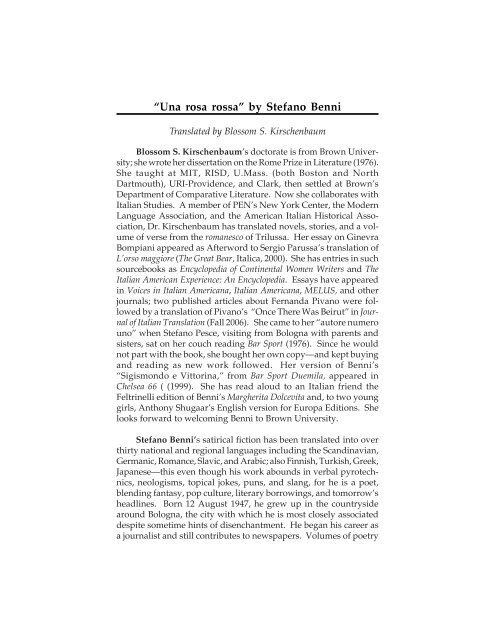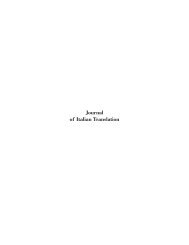Journal of Italian Translation - Brooklyn College - Academic Home ...
Journal of Italian Translation - Brooklyn College - Academic Home ...
Journal of Italian Translation - Brooklyn College - Academic Home ...
Create successful ePaper yourself
Turn your PDF publications into a flip-book with our unique Google optimized e-Paper software.
42<br />
<strong>Journal</strong> <strong>of</strong> <strong>Italian</strong> <strong>Translation</strong><br />
“Una rosa rossa” by Stefano Benni<br />
Translated by Blossom S. Kirschenbaum<br />
Blossom S. Kirschenbaum’s doctorate is from Brown University;<br />
she wrote her dissertation on the Rome Prize in Literature (1976).<br />
She taught at MIT, RISD, U.Mass. (both Boston and North<br />
Dartmouth), URI-Providence, and Clark, then settled at Brown’s<br />
Department <strong>of</strong> Comparative Literature. Now she collaborates with<br />
<strong>Italian</strong> Studies. A member <strong>of</strong> PEN’s New York Center, the Modern<br />
Language Association, and the American <strong>Italian</strong> Historical Association,<br />
Dr. Kirschenbaum has translated novels, stories, and a volume<br />
<strong>of</strong> verse from the romanesco <strong>of</strong> Trilussa. Her essay on Ginevra<br />
Bompiani appeared as Afterword to Sergio Parussa’s translation <strong>of</strong><br />
L’orso maggiore (The Great Bear, Italica, 2000). She has entries in such<br />
sourcebooks as Encyclopedia <strong>of</strong> Continental Women Writers and The<br />
<strong>Italian</strong> American Experience: An Encyclopedia. Essays have appeared<br />
in Voices in <strong>Italian</strong> Americana, <strong>Italian</strong> Americana, MELUS, and other<br />
journals; two published articles about Fernanda Pivano were followed<br />
by a translation <strong>of</strong> Pivano’s “Once There Was Beirut” in <strong>Journal</strong><br />
<strong>of</strong> <strong>Italian</strong> <strong>Translation</strong> (Fall 2006). She came to her “autore numero<br />
uno” when Stefano Pesce, visiting from Bologna with parents and<br />
sisters, sat on her couch reading Bar Sport (1976). Since he would<br />
not part with the book, she bought her own copy—and kept buying<br />
and reading as new work followed. Her version <strong>of</strong> Benni’s<br />
“Sigismondo e Vittorina,” from Bar Sport Duemila, appeared in<br />
Chelsea 66 ( (1999). She has read aloud to an <strong>Italian</strong> friend the<br />
Feltrinelli edition <strong>of</strong> Benni’s Margherita Dolcevita and, to two young<br />
girls, Anthony Shugaar’s English version for Europa Editions. She<br />
looks forward to welcoming Benni to Brown University.<br />
Stefano Benni’s satirical fiction has been translated into over<br />
thirty national and regional languages including the Scandinavian,<br />
Germanic, Romance, Slavic, and Arabic; also Finnish, Turkish, Greek,<br />
Japanese—this even though his work abounds in verbal pyrotechnics,<br />
neologisms, topical jokes, puns, and slang, for he is a poet,<br />
blending fantasy, pop culture, literary borrowings, and tomorrow’s<br />
headlines. Born 12 August 1947, he grew up in the countryside<br />
around Bologna, the city with which he is most closely associated<br />
despite sometime hints <strong>of</strong> disenchantment. He began his career as<br />
a journalist and still contributes to newspapers. Volumes <strong>of</strong> poetry
















